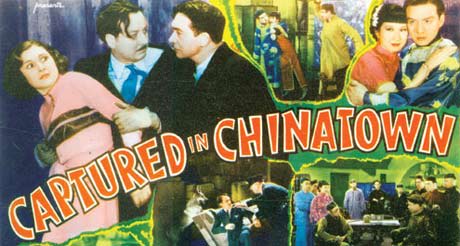With existing documentaries focusing on Hollywoods portrayal of blacks (Classified X), Hispanics (The Bronze Screen) and gays (The Celluloid Closet), it was inevitable that one would surface about another minority group, the Chinese. Arthur Dongs excellent film traces Hollywoods racist portrayal of the Chinese but also celebrates some hidden triumphs.
A celebrated documentarian from San Francisco, Dong has collected clips from more than 90 movies and gathered over a dozen interviews, from Ang Lee to Christopher Lee. Stereotypes abound. During the silent era, the Chinese were evil foreigners. As recently as the 80s, Hollywood created the nerdy Chinese student, Long Duck Dong, in John Hughess insipid Sixteen Candles.
For most of its history, Hollywood has adopted "yellowface, whereby white actors slant their eyes and talk in Pidgin English. So, its surprising to hear Englishman Christopher Lee of the Fu Manchu movies discuss the politics of portraying another race. Actor B.D. Wong raises provocative points about growing up Chinese-American and hating himself for being both Asian and gay, two groups denigrated by the mass media. Germanys Luise Rainer (The Good Earth) upholds her right as an artist to interpret any nationality. At the same time, 60s star Nancy Kwan (at TIFF to revive 1962s hit musical Flower Drum Song) decries the lack of good roles for Asians.
However, Dongs film also celebrates hidden victories. Wayne Wangs 1981 landmark, Chan Is Missing, opened the door for Asian-American cinema. The young punks in Justin Lins Better Luck Tomorrow (2003) shattered the model minority stereotype. Most of all, Dong scores a coup by uncovering 1917s The Curse of Quon Gwon, the first self-produced Chinese-American film, which has since been placed on the prestigious Nation Film Registry in the U.S.
Hollywood Chinese is told with surprising humour, candour and intelligence, yet is neither preachy nor angry. Judging by the heated Q&A following the TIFF screening, Hollywood Chinese opens a wide discussion about how minorities, not only the Chinese, are portrayed on screen. This is a film that should be seen by anyone who loves movies.
(Deep Focus)A celebrated documentarian from San Francisco, Dong has collected clips from more than 90 movies and gathered over a dozen interviews, from Ang Lee to Christopher Lee. Stereotypes abound. During the silent era, the Chinese were evil foreigners. As recently as the 80s, Hollywood created the nerdy Chinese student, Long Duck Dong, in John Hughess insipid Sixteen Candles.
For most of its history, Hollywood has adopted "yellowface, whereby white actors slant their eyes and talk in Pidgin English. So, its surprising to hear Englishman Christopher Lee of the Fu Manchu movies discuss the politics of portraying another race. Actor B.D. Wong raises provocative points about growing up Chinese-American and hating himself for being both Asian and gay, two groups denigrated by the mass media. Germanys Luise Rainer (The Good Earth) upholds her right as an artist to interpret any nationality. At the same time, 60s star Nancy Kwan (at TIFF to revive 1962s hit musical Flower Drum Song) decries the lack of good roles for Asians.
However, Dongs film also celebrates hidden victories. Wayne Wangs 1981 landmark, Chan Is Missing, opened the door for Asian-American cinema. The young punks in Justin Lins Better Luck Tomorrow (2003) shattered the model minority stereotype. Most of all, Dong scores a coup by uncovering 1917s The Curse of Quon Gwon, the first self-produced Chinese-American film, which has since been placed on the prestigious Nation Film Registry in the U.S.
Hollywood Chinese is told with surprising humour, candour and intelligence, yet is neither preachy nor angry. Judging by the heated Q&A following the TIFF screening, Hollywood Chinese opens a wide discussion about how minorities, not only the Chinese, are portrayed on screen. This is a film that should be seen by anyone who loves movies.
